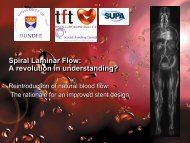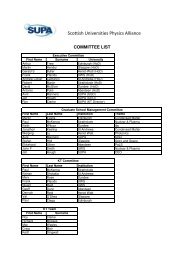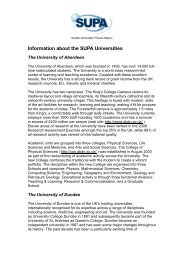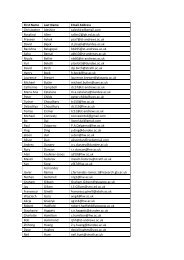Catalogue of Courses & Student Handbook - SUPA
Catalogue of Courses & Student Handbook - SUPA
Catalogue of Courses & Student Handbook - SUPA
Create successful ePaper yourself
Turn your PDF publications into a flip-book with our unique Google optimized e-Paper software.
Core Skills <strong>Courses</strong><br />
Physics Teaching Workshop (<strong>SUPA</strong>PTW)<br />
Lecturer: Paul Yates<br />
Institution: Heriot Watt<br />
Hours Equivalent Credit: 5<br />
Course Description<br />
This is a one-day, face-to-face workshop run by the Higher Education<br />
Academy and approved by the Institute <strong>of</strong> Physics.<br />
The workshop is aimed at postgraduates who undertake part time<br />
teaching in physics, particularly but not exclusively in a laboratory<br />
setting. The morning sessions will explore some <strong>of</strong> the issues that have<br />
or may arise in physics laboratories and other teaching settings, while<br />
in the afternoon we will concentrate on practical solutions which can be<br />
implemented. The style <strong>of</strong> the workshop will be informal and interactive,<br />
and participants will be encouraged to share their ideas and experience<br />
in small groups throughout the day. There will be an opportunity for<br />
participants to raise and discuss any issues from their own teaching<br />
experience and further pr<strong>of</strong>essional development opportunities and<br />
HEA support will be presented. The workshop is intended to complement<br />
the generic in house training that may have been received, but will also<br />
be accessible to those who have not yet received training in aspects<br />
<strong>of</strong> teaching. After attending the training students should be better<br />
prepared to support learning and teaching in physics by a variety <strong>of</strong><br />
methods. They will also have been encouraged to consider their future<br />
development by engaging with opportunities provided by the HEA and<br />
other bodies. They will also be aware <strong>of</strong> online and other resources to<br />
support their teaching.<br />
Problem Solving Skills for Physicists (<strong>SUPA</strong>PSS)<br />
Lecturer: Peter Sneddon<br />
Institution: Glasgow/ Edinburgh<br />
Hours Equivalent Credit: 2 full days<br />
Assessment: Continually assessed by portfolio<br />
Course Description<br />
This course is based around the teaching <strong>of</strong> skills, rather than new<br />
theoretical knowledge. It will use examples from a wide range <strong>of</strong> physics<br />
disciplines to highlight key skills that physicists need, whatever their<br />
speciality and intended destination after graduation. The course will<br />
use case studies from across the subjects <strong>of</strong> astronomy and physics,<br />
but is designed in such a way as to be suitable for all <strong>SUPA</strong> students,<br />
no matter their speciality. It will feature a range <strong>of</strong> techniques and<br />
approaches that are useful when facing unfamiliar problems, such as:<br />
when to use approximations and when not to; back <strong>of</strong> the envelope<br />
and order <strong>of</strong> magnitude calculations; dimensional analysis; use <strong>of</strong><br />
multiple representations; error estimation and calculation; problem<br />
type identification. The course will be delivered in two face-to-face day<br />
workshops to facilitate group working and cooperation, supported by<br />
online resources and materials. Assessment will be by the construction<br />
<strong>of</strong> a brief portfolio <strong>of</strong> teaching resources which illustrate the principles<br />
behind or examples <strong>of</strong> the use <strong>of</strong> some <strong>of</strong> the featured techniques:<br />
this will also give practice (and provide useful resources) for graduate<br />
teaching assistant activities.<br />
ROOT (<strong>SUPA</strong>ROO)<br />
Lecturer: Adrian Buzatu<br />
Institution: Glasgow<br />
Hours Equivalent Credit: 8 (2 half-day Labs)<br />
Assessment: Continuous Assessment<br />
Course Description<br />
This course will provide an introduction to the ROOT framework<br />
(http://root.cern.ch), with examples covering:<br />
• using ROOT interactively<br />
• using histograms, trees and ntuples<br />
• writing and running macros<br />
• compiling a ROOT application<br />
• fitting histograms.<br />
S<strong>of</strong>tware Carpentry (<strong>SUPA</strong>SWC)<br />
Lecturer: Mike Jackson, Norman Gray<br />
Institution: Edinburgh/ Glasgow<br />
Hours Equivalent Credit: 2 full days<br />
Assessment:<br />
Course Description<br />
Many students need to write (computer) code <strong>of</strong> some type or other,<br />
and though we don’t want to turn them into ‘programmers’, it would be<br />
good to have them do that part <strong>of</strong> their work effectively, now and in the<br />
(transferrable) future. Quite <strong>of</strong>ten, the habits they end up with are those<br />
they acquire from their supervisors and peers; right now, those are <strong>of</strong>ten<br />
rather poor s<strong>of</strong>tware habits.<br />
S<strong>of</strong>tware Carpentry (SWC) is an<br />
organisation which is focused on exactly this group -- coding scientists<br />
-- and which is currently being part-funded in the UK by EPSRC via the<br />
S<strong>of</strong>tware Sustainability Institute in Edinburgh. They run two-day ‘boot<br />
camps’, and one such would ideally be followed up by articulation with<br />
discipline-specific s<strong>of</strong>tware tutorials. The goal <strong>of</strong> the SWC courses is to<br />
instil pragmatic good practice in scientists who are more interested in<br />
doing science than in programming. The point <strong>of</strong> this is to help beginning<br />
scientists who code, to write more reliable (tested), more maintainable,<br />
and more manageable code faster.<br />
Vacuum Technology (<strong>SUPA</strong>VAC)<br />
Lecturer: Kevin Prior<br />
Institution: Heriot Watt<br />
Hours Equivalent Credit: 10<br />
Assessment: Continuous Assessment<br />
Course Description<br />
This course will concentrate on the practical aspects <strong>of</strong> vacuum<br />
technology, and will be primarily <strong>of</strong> interest to students who are<br />
confronted with a vacuum system for the first time or are faced<br />
with using, maintaining or developing a system. Topics which will be<br />
covered include:<br />
1. Introduction to vacuum technology. The basic classification <strong>of</strong> vacuum<br />
grades and system types. Important gas properties relevant to<br />
vacuum systems. Sources <strong>of</strong> Information.<br />
2. Measurement <strong>of</strong> pressure in vacuum systems.<br />
3. Pumping: Classes <strong>of</strong> pumps and examples <strong>of</strong> different pumping<br />
machines.<br />
4. Gas flow in through a system, gas throughput and conductance,<br />
sources and pumping speed. Leaks, virtual leaks and outgassing.<br />
5. System design, construction and troubleshooting. High Vacuum and<br />
ultra high vacuum components.<br />
6. Mass spectrometers and leak detection. Residual gas composition in<br />
different pressure regimes.<br />
7. Real system examples. Here, students will be encouraged to discuss<br />
their own systems and any problems they may have encountered.<br />
30







